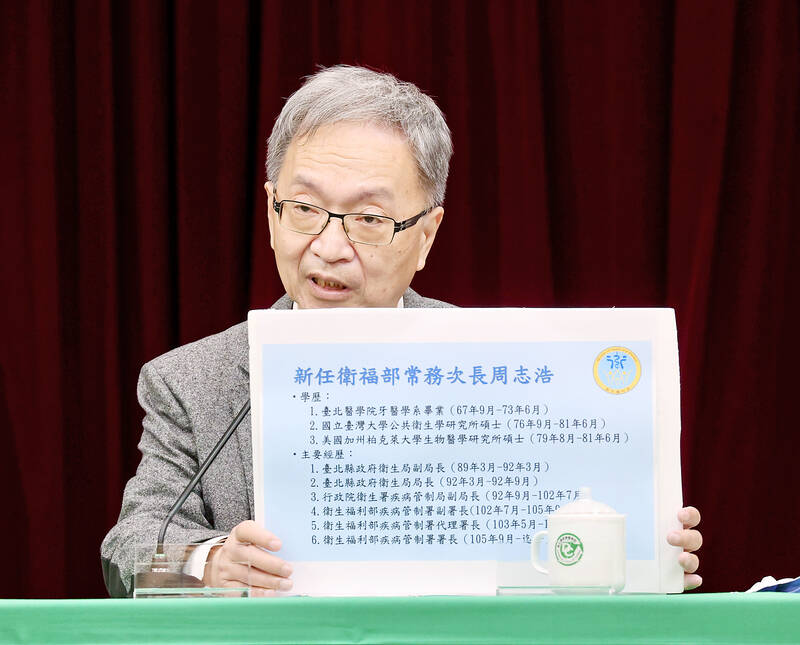Minister of Health and Welfare Hsueh Jui-yuan (薛瑞元) yesterday announced the promotion of Centers for Disease Control (CDC) Director-General Chou Jih-haw (周志浩) to deputy minister of health and welfare, while Chou’s deputy, Chuang Jen-hsiang (莊人祥), is to become the new CDC head.
Chou is to take over the post vacated by Shih Chung-liang (石崇良), who last week was tapped to head the National Health Insurance Administration (NHIA), Hsueh said.
Chou, who had headed the CDC since September 2016, had for the past more than three years put in a lot of efforts as the leader of the CDC, as well as head of the Central Epidemic Command Center’s (CECC) disease surveillance division, to deal with COVID-19 response and control, the minister said.

Photo: CNA
Hsueh added that he earlier yesterday received the order for the promotions, which were approved by the Executive Yuan.
“Both of them have specialized expertise, not only in COVID-19 response, but also in the prevention and control of many communicable diseases, and have performed well given their long-term experience in the field,” Hsueh said, adding that he expects a seamless transition into their new jobs.
As the end of the COVID-19 pandemic is in sight, the CECC will gradually be wrapping up its operations, so there will be no changes in official titles and duties, Hsueh said.
That means Chou will continue to head the CECC’s disease surveillance division, while Chuang will remain as the head of the communicable disease prevention division and Shih the head of the medical response division.
However, there will be an adjustment to the CECC spokesperson position, with CDC Deputy Director-General Philip Lo (羅一鈞), deputy head of the CECC’s medical response division, likely taking over the position from Chuang, Hsueh said.
Asked about the shortage of some medicines, such as antacid magnesium oxide and amoxicillin antibiotic products, Hsueh said the ministry had held a meeting with pharmaceutical companies and asked them to boost production, as well as adjust product distribution to better meet the needs of hospitals, clinics and pharmacies.
The ministry is looking at medium-term solutions, such as expanding the Food and Drug Administration’s drug shortage reporting platform to facilitate detection of shortages, he said.
A longer-term solution is revising the National Health Insurance system’s drug procurement policies to avoid a supply and demand imbalance, Hsueh said.

Taiwan has received more than US$70 million in royalties as of the end of last year from developing the F-16V jet as countries worldwide purchase or upgrade to this popular model, government and military officials said on Saturday. Taiwan funded the development of the F-16V jet and ended up the sole investor as other countries withdrew from the program. Now the F-16V is increasingly popular and countries must pay Taiwan a percentage in royalties when they purchase new F-16V aircraft or upgrade older F-16 models. The next five years are expected to be the peak for these royalties, with Taiwan potentially earning

STAY IN YOUR LANE: As the US and Israel attack Iran, the ministry has warned China not to overstep by including Taiwanese citizens in its evacuation orders The Ministry of Foreign Affairs (MOFA) yesterday rebuked a statement by China’s embassy in Israel that it would evacuate Taiwanese holders of Chinese travel documents from Israel amid the latter’s escalating conflict with Iran. Tensions have risen across the Middle East in the wake of US and Israeli airstrikes on Iran beginning Saturday. China subsequently issued an evacuation notice for its citizens. In a news release, the Chinese embassy in Israel said holders of “Taiwan compatriot permits (台胞證)” issued to Taiwanese nationals by Chinese authorities for travel to China — could register for evacuation to Egypt. In Taipei, the ministry yesterday said Taiwan

Taiwan is awaiting official notification from the US regarding the status of the Agreement on Reciprocal Trade (ART) after the US Supreme Court ruled US President Donald Trump's global tariffs unconstitutional. Speaking to reporters before a legislative hearing today, Premier Cho Jung-tai (卓榮泰) said that Taiwan's negotiation team remains focused on ensuring that the bilateral trade deal remains intact despite the legal challenge to Trump's tariff policy. "The US has pledged to notify its trade partners once the subsequent administrative and legal processes are finalized, and that certainly includes Taiwan," Cho said when asked about opposition parties’ doubts that the ART was

If China chose to invade Taiwan tomorrow, it would only have to sever three undersea fiber-optic cable clusters to cause a data blackout, Jason Hsu (許毓仁), a senior fellow at the Hudson Institute and former Chinese Nationalist Party (KMT) legislator, told a US security panel yesterday. In a Taiwan contingency, cable disruption would be one of the earliest preinvasion actions and the signal that escalation had begun, he said, adding that Taiwan’s current cable repair capabilities are insufficient. The US-China Economic and Security Review Commission (USCC) yesterday held a hearing on US-China Competition Under the Sea, with Hsu speaking on